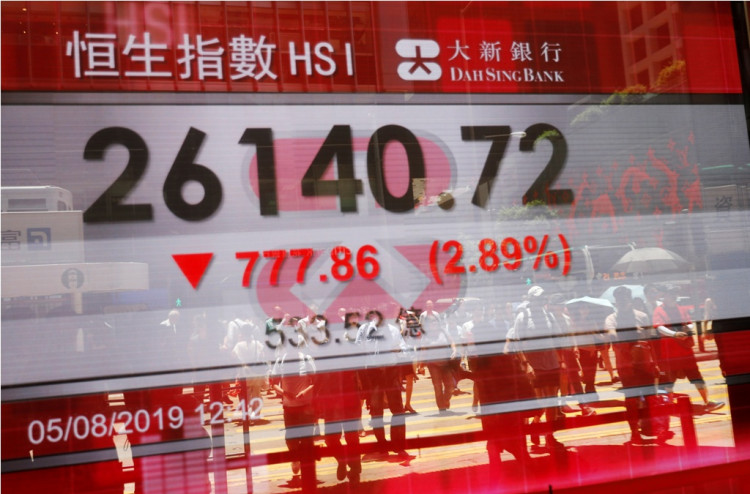Following Friday's China-U.S. trade war escalation, Asian stocks dipped on Monday morning. The Hong Kong Hang Seng index led the way in significant losses as it posted a decline of 3.22 percent.
According to CNBC, most Asian stocks dipped as markets reacted to U.S. President Donald Trump's announcement before the weekend that the 25 percent in tariffs on $250 billion of Chinese goods will now hit 30 percent.
Among the stocks that saw the biggest losses aside from the Hang Sang index are Japan's Nikkei 225 that lost 2.33 percent and MSCI Asia that dropped 2.02 percent. Mainland China stocks, the Shenzhen component, the Shenzhen composite, and the Shanghai composite, shed 1.15 percent, 1.308 percent, and 1.2 percent respectively.
Over the weekend, Trump said at the G-7 summit that he can declare a national emergency, adding that he regrets not increasing the tariffs on Chinese goods even higher than the original percentage.
While some eyes are focused on the trade war and its potential effects on Chinese companies exporting to the United States, many analysts are still concerned about the U.S. economy.
Managing Director at IMA Asia, Richard Martin, pointed out that business owners in the U.S. are "nervous on two levels." He said they are concerned about how Trump will use the country's emergency authorities as well as the potentially negative response of Chinese companies they have partnerships with.
Oil prices also slumped following the news of Trump's additional tariffs, with American crude futures shedding 1.9 percent and Brent crude futures dropping by 1.5 percent.
Despite the bad news from Washington, Beijing announced on Monday that it is still seeking "calm" resolve for the ongoing trade dispute with the U.S. The Chinese government's Vice Premier Liu He said there are no beneficiaries in the trade war.
During a tech summit in Chongqing, Liu noted that Beijing wants to discuss the issue and the government is against further escalations. He added that it's not just China and the U.S. that are being affected by the dispute. Other countries around the world are also involved due to global supply chains.
Finally, Liu assured the masses that American firms are still welcome to do business in the country. He said the government will continue to create a good business environment for global companies.
Amid stocks slumping, Dow futures also saw a small sign of recovery on Monday morning's trading session. The Dow Jones Industrial Average stock futures saw a decline of 53.90 points upon opening.
Analysts are expecting further declines in opening figures for both the Nasdaq 100 and S&P 500.




